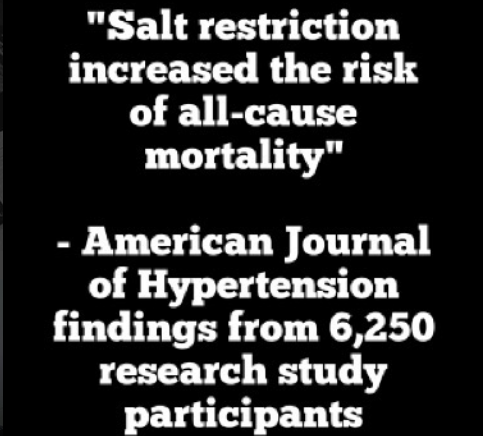|
Every cell in the human body requires sodium and chloride for base functionality. So it stands to reason that we will improve biological function by restricting our salt intake, right? Yeah. It never made sense even when it allegedly ostensibly "made sense." Scientific American takes the subject to task here: https://www.scientificamerican.com/article/its-time-to-end-the-war-on-salt/. They weren't the first to do it.
Though your clinician may still default to this now-defunct and archaic tactic of salt-restriction recommendation, it was never really en vogue in the first place; and their own organization, the American Medical Association, has repeatedly found that moderating salt intake shows no conclusive evidence of reduced risk of death: https://jamanetwork.com/journals/jama/fullarticle/899663. Of course, if your doctors don't read their own publication, they can't know that contemporary science and medicine do not support the high-salt/increased-risk-of-cardiac-event fictional hypothesis. Like when kids learn Santa Claus isn't real, it's usually not enough to just hear that something is a made up fiction. We generally need to wrap our heads around how the fiction took hold as a truth in order to relinquish it back into the ether of mythologies and pseudosciences. Essentially, this little ditty goes something like this: Sodium is mostly held in a solution in the body. That solution requires fluid. More fluid means more blood. More blood means more possible pressure. Higher pressure has an association with increase health risk. Ergo, salt is evil. There are a lot of question-begging pieces to this seemingly-reasonable series of logic statements. The first one, of course, is that there is no mention of insulin or inflammation. Without insulin or inflammation, massive piles of sodium cannot acquire more solution. That is, in an absence of insulin and inflammation, we can't retain sodium in the first place. So we never get to the increased blood volume proposal. Thus, trying to address systemic inflammation via sodium was never going to work in the first place. In fact, because it is an essential nutrient, the very people who need to recover their health the most probably need MORE sodium, not less. Thus they get a double hit on their cardiovascular risk when trying to listen to the old dogma. Prepare for three shockers. One - if you drop carbohydrate intake, you drop insulin. Two - if you drop stress, you drop the need for increased blood volume. Three - if you drop weight... YOU ARE A SMALLER ANIMAL whose blood volume will never be as much as a bigger animal. As you do those three things consistently, inflammation is better controlled, and cardiovascular risk decreases or evaporates. The other ENORMOUS question-begging within the salt-myth is that the addition or subtraction of dietary salt has ONLY immediate effects of blood pressure. That is, your underlying levels of inflammation and these other things you might've heard about before called organs prevent blood pressure from going up or down in perpetuity. You can't just keep adding salt and keep raising blood pressure. It doesn't work that way. Conversely, you can't just reduce salt and keep reducing blood pressure. You have this funny system called KIDNEY function. If the signal you send to your body is "I can't manage stress well; I am overweight; and I am inflamed," good luck trying to trick it into reducing risk of death by giving it less sodium - this sodium, need I remind you, which makes life possible in the first place. Last but not least, like all other correlations in disease, we don't always know when correlation is causation or which direction the causal arrow points. Does it stand to reason that an otherwise healthy body magically creates high blood pressure; and that ONE SINGLE simple change leads to risk? Or is it more likely that a multifactorial unhealthy body is incurring damage that IS heart disease; and that disease is either causing increased blood pressure or your body is trying to address the disease via efforts which involve more blood volume? Of course, if the latter, not only will reducing sodium be futile, it may dramatically raise risk of death. That's to mention nothing of the many many many other systems in the body which of absolute necessity require copious sodium to function at all, let alone optimally.
0 Comments
Your comment will be posted after it is approved.
Leave a Reply. |
Elev8 Wellness
|
LIVE. AWESOME.We offer the highest quality in personal fitness, nutrition, and mindset coaching, helping you achieve your fitness, health, wellness and performance goals no matter the obstacle. With virtual online training and private, in-studio training we make it easier to reach your wellness goals safely.
No more can't. No more not good enough. If you compete in a sport, let your mind no longer hold you back from being the greatest. If you don't, let your mind no longer hold you back from being the best version of you that you can be. Sign-up for a Tour Covid Screen Waiver Elev8 Waiver Become an Elev8 Instructor Space Rental |
6244 lyndale ave. s., minneapolis, mn 55423
|
© 2021 Elev8 Wellness LLC. All Rights Reserved. site map | contribute | SITE BY Sproute Creative


 RSS Feed
RSS Feed
